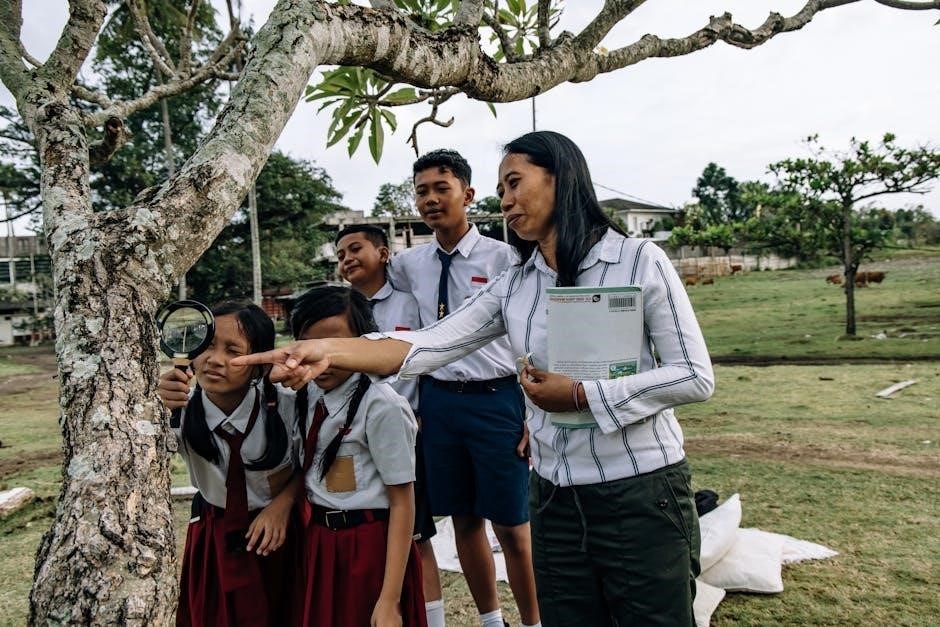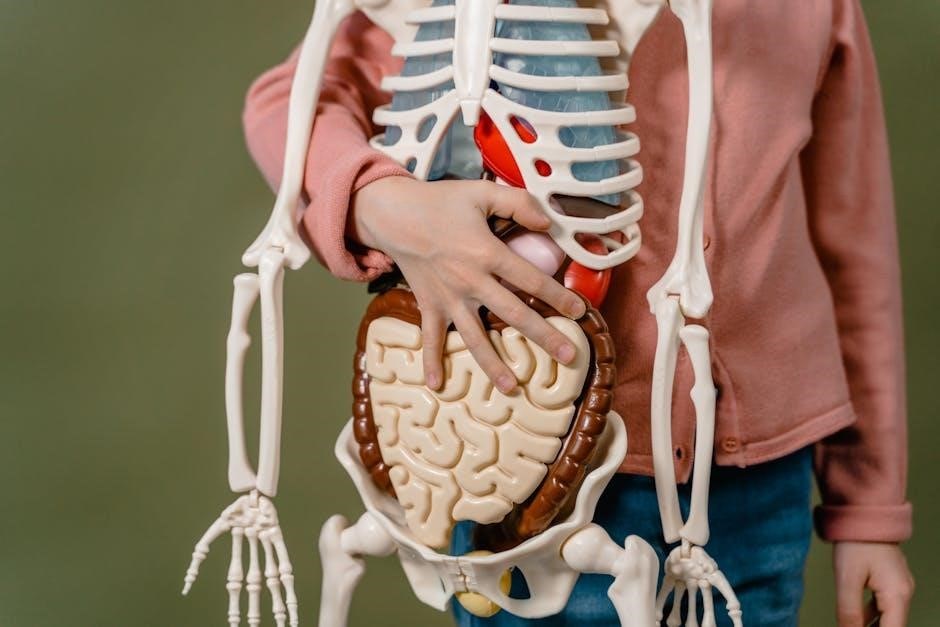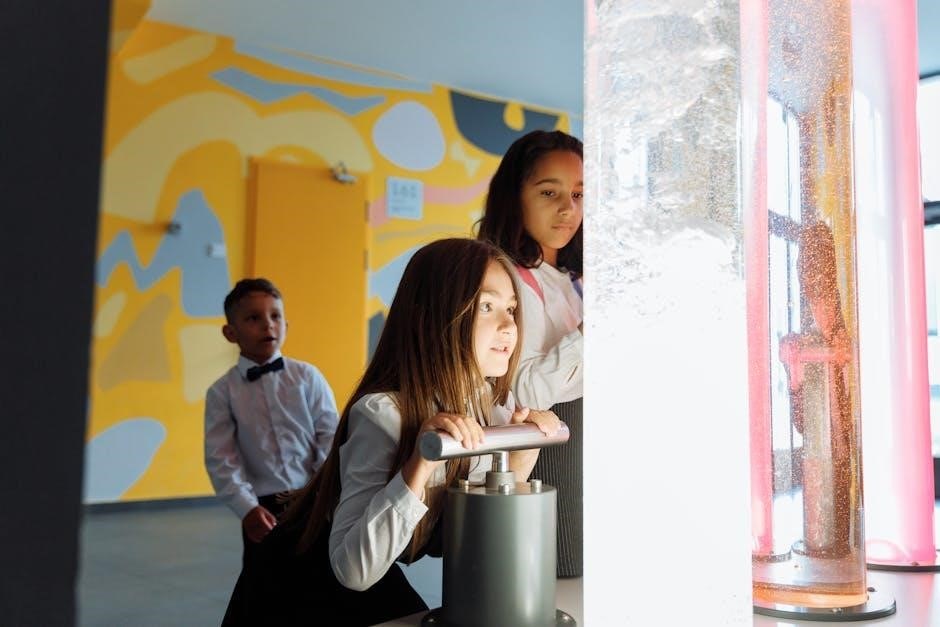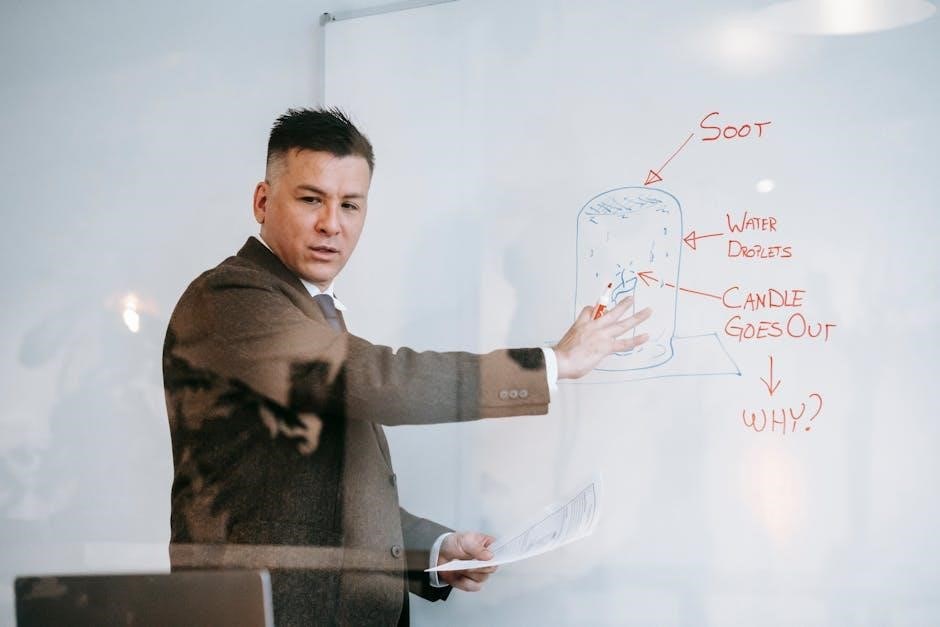Grade 2 Science Lessons PDF: A Comprehensive Guide
This guide provides a detailed overview of Grade 2 science curriculum‚ offering engaging lesson plans‚ interactive activities‚ and resources to foster curiosity and skill development in young learners.
The Grade 2 science curriculum is designed to spark curiosity and foundational knowledge in young learners. It introduces basic concepts of the natural and physical world‚ encouraging exploration and critical thinking. Through interactive lessons and hands-on activities‚ students develop essential skills in observation‚ experimentation‚ and problem-solving. The curriculum aligns with STEAM education‚ integrating science‚ technology‚ engineering‚ arts‚ and mathematics to create engaging learning experiences. Topics such as plants‚ animals‚ simple machines‚ and seasonal changes are covered‚ fostering a deeper understanding of the environment and the world around them. This comprehensive approach prepares students for future learning and nurtures a lifelong love for science and discovery.
Key Topics Covered in Grade 2 Science
Grade 2 science focuses on foundational topics that build curiosity and understanding. Students explore the life cycles of plants‚ learning about growth‚ parts‚ and their importance in the ecosystem. Animals and their habitats are introduced‚ emphasizing adaptation and diversity. Simple machines and tools are covered‚ highlighting their role in everyday life. Seasonal changes and weather patterns are studied to explain natural cycles. These topics are supported by hands-on activities‚ fostering observation and experimentation skills. The curriculum also encourages critical thinking through interactive worksheets and project-based learning‚ ensuring a well-rounded and engaging educational experience for young learners.

Exploring the Natural World
Grade 2 science lessons introduce students to the natural world through hands-on learning and interactive content‚ fostering curiosity and appreciation for the environment and its wonders.
Plants and Their Life Cycle
Grade 2 students explore the fascinating world of plants‚ learning about their life cycle from seeds to mature plants. Lessons include hands-on activities‚ such as planting seeds and observing growth. Interactive PDF resources provide colorful diagrams and labeled illustrations to help children understand photosynthesis and the roles of roots‚ stems‚ and leaves. Worksheets and quizzes reinforce key concepts‚ while experiments like growing plants in different conditions encourage scientific inquiry. This section also covers how plants adapt to their environments and the importance of plants in our ecosystem. Engaging visuals and real-world examples make learning about plants fun and accessible for young students.
Animals and Their Habitats
Grade 2 science lessons introduce students to the diverse world of animals and their habitats. Through engaging PDF materials‚ children learn about different ecosystems‚ such as forests‚ oceans‚ and deserts‚ and the animals that inhabit them. Lessons focus on understanding how animals adapt to their environments‚ their survival needs‚ and how they interact with their surroundings. Activities include identifying animal characteristics‚ matching animals to their habitats‚ and exploring food chains. Interactive worksheets and quizzes reinforce learning‚ while creative projects like building dioramas or drawing habitats encourage hands-on exploration. This section fosters curiosity about wildlife and promotes an appreciation for biodiversity and conservation.

Understanding the Physical World
This section introduces students to simple machines‚ tools‚ and natural phenomena like seasonal changes and weather patterns‚ helping them build foundational science skills through interactive activities and visual aids.
Simple Machines and Tools
Grade 2 students explore simple machines like levers‚ pulleys‚ and wheels‚ learning how they make work easier. Hands-on activities and experiments help them understand basic mechanisms. Interactive PDF resources include diagrams and videos to visualize these concepts. Students also discover how tools like hammers‚ screwdrivers‚ and magnifying glasses are used in everyday life. Group projects encourage collaboration‚ where students design and build simple machines using everyday materials. This section fosters problem-solving skills and curiosity about the physical world‚ preparing students for more complex science topics in later grades. Engaging worksheets and quizzes reinforce learning‚ ensuring a solid foundation in understanding tools and machines.

Seasonal Changes and Weather Patterns
Grade 2 students learn about the four seasons‚ their characteristics‚ and how weather patterns change throughout the year. Interactive PDF lessons include activities like creating weather charts and observing plant growth during different seasons. Students explore the water cycle‚ day and night cycles‚ and how these affect weather. Hands-on experiments‚ such as making rain clouds in a jar‚ engage young learners. Digital tools‚ like IXL’s interactive simulations‚ help visualize weather phenomena. Outdoor observations and seasonal art projects reinforce learning‚ encouraging students to connect science with their everyday experiences. This topic fosters environmental awareness and curiosity about the world around them.

Scientific Skills and Inquiry
This section focuses on developing essential scientific skills through interactive PDF lessons‚ hands-on experiments‚ and guided inquiries. Students learn to observe‚ question‚ and explore the world around them.
Developing Observation and Experimentation Skills
Building observation and experimentation skills is crucial for young scientists. Grade 2 science PDF lessons incorporate activities that encourage students to explore their surroundings‚ ask questions‚ and test hypotheses.
Through guided experiments‚ children learn to use tools like magnifying glasses and simple measuring devices. These hands-on experiences enhance their ability to collect data and draw conclusions.
Interactive worksheets within the PDFs provide opportunities for students to record observations‚ fostering systematic thinking and creativity. This foundational skill set prepares them for more complex scientific inquiries in the future.
Encouraging Curiosity and Critical Thinking
Fostering curiosity and critical thinking in Grade 2 students is essential for their scientific growth; PDF lessons incorporate open-ended questions and real-world scenarios to spark their natural curiosity.
Interactive activities‚ such as puzzles and problem-solving tasks‚ encourage students to think deeply and explore solutions. These exercises help build confidence and intellectual independence.
By integrating storytelling and hands-on exploration‚ the curriculum inspires students to ask “why” and “how‚” developing their ability to analyze and evaluate information. This approach prepares them to think creatively and solve problems effectively in all areas of learning.

Resources for Grade 2 Science Lessons
Discover a variety of Grade 2 science resources‚ including PDF workbooks‚ interactive activities‚ and engaging worksheets. These tools help students explore science concepts in a fun and structured way.
From quizzes to puzzles‚ these materials are designed to make learning accessible and enjoyable. They also include hands-on experiments and visual aids.
These resources align with curriculum standards‚ ensuring comprehensive coverage of key topics while fostering a love for science in young learners.
Recommended PDF Materials and Workbooks
Enhance your Grade 2 science lessons with high-quality PDF materials and workbooks. These resources offer structured lesson plans‚ engaging activities‚ and visual aids to support learning.
Popular options include the “Into Science Texas Grade 2 Student Edition” and “Science Explorer for Young Learners.” These PDFs are designed to align with curriculum standards.
Worksheets and activity sheets are included to reinforce concepts like plant life cycles‚ animal habitats‚ and simple machines. Interactive PDFs with quizzes and puzzles make learning fun.
Many materials are available for free download‚ providing accessible education for students. These resources cater to diverse learning styles‚ ensuring every child can succeed.
Teachers can supplement their lesson plans with these workbooks‚ creating a comprehensive and engaging science program for Grade 2 students.
Interactive Activities and Worksheets
Engage your students with interactive activities and worksheets designed to make Grade 2 science lessons fun and effective. These resources include quizzes‚ puzzles‚ and hands-on experiments.
Worksheets often feature colorful illustrations and simple instructions‚ perfect for young learners. Many PDF materials incorporate interactive elements like fill-in-the-blanks and matching games.
Teachers can use these activities to reinforce concepts such as plant life cycles‚ animal habitats‚ and seasonal changes. Online platforms offer downloadable worksheets aligned with curriculum standards.
Interactive activities also promote collaboration‚ encouraging students to work in pairs or groups. These tools help develop critical thinking and problem-solving skills in a playful manner.
With interactive science activities‚ learning becomes an exciting adventure for Grade 2 students‚ fostering curiosity and a love for discovery.

Assessment and Evaluation
Assessment tools like quizzes and tests help evaluate students’ understanding of science concepts; Project-based evaluations allow practical application of knowledge‚ ensuring comprehensive learning and skill development.
Quizzes and Tests for Knowledge Retention
Quizzes and tests are essential tools for assessing students’ understanding of science concepts. These evaluations help reinforce learning by identifying areas where students may need additional support. Regular testing ensures that key ideas are retained and builds confidence in applying knowledge. PDF materials often include practice tests and quizzes‚ making it easy for teachers to track progress. Interactive activities and worksheets complement these assessments‚ providing a well-rounded approach to learning. By frequently testing‚ instructors can monitor student development and adjust lessons accordingly. This method not only solidifies foundational knowledge but also prepares students for more complex science topics in higher grades. Consistent evaluation fosters academic growth and readiness for future challenges.
Project-Based Assessments for Practical Learning
Project-based assessments are a dynamic way to evaluate students’ understanding of scientific concepts through hands-on activities. These assessments encourage creativity and critical thinking‚ allowing students to apply knowledge in real-world contexts. For example‚ building models of habitats or creating presentations about seasonal changes. This approach fosters collaboration and problem-solving skills‚ making learning engaging and interactive. Unlike traditional tests‚ project-based assessments provide a comprehensive view of a student’s ability to synthesize information and communicate ideas effectively. They also cater to different learning styles‚ ensuring that every student has the opportunity to shine. By integrating STEAM elements‚ these projects prepare students for a future where innovation and practical skills are essential. This method not only enhances retention but also nurtures a deeper appreciation for science and its applications.
The Grade 2 science curriculum lays a strong foundation for future learning‚ fostering curiosity and essential skills in young students. By engaging with hands-on activities and project-based assessments‚ students develop a deeper understanding of scientific concepts. As they progress‚ these skills will serve as a bridge to more complex topics in higher grades. Encouraging a love for science early on can inspire lifelong learning and exploration. Parents and educators can further support students by providing additional resources‚ such as science-themed books or educational apps‚ to nurture their interest. The journey through Grade 2 science is just the beginning of a lifetime of discovery and growth.



